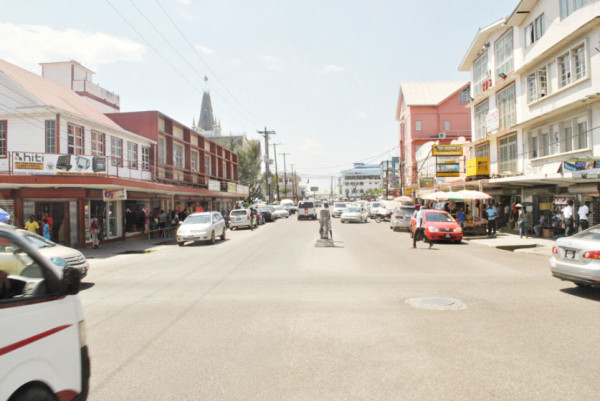Even as Georgetown begins to assume a greater sense of tidiness under an aggressive, state-supported cleanup campaign, City Hall is reporting challenges associated with citizens who are evincing a resistance to attempts to restore the capital to its former glory.
As small armies of municipal employees and contracted workers clear canals of silt, cut grass, clear alleyways and remove what have long been permanent if illegal garbage mounds,
City Hall says it continues to discover clear cases of recalcitrant citizens who appear stuck in their old ways.

Earlier this week the municipality’s Public Relations Officer Debra Lewis said the city is currently in the process of taking action against “two prominent Regent Street traders” who, last week, were implicated in the dumping of packaging associated with trading in the city.
Lewis told Stabroek Business that based on reports the council received, it investigated the allegations and caught persons dumping the material. Under questioning, the persons pointed to the sources of the refuse.
Lewis said she believed other major businesses in the capital were still in the habit of dumping garbage associated with trading in their respective sectors.
Clearly anxious that it can put the ‘bad old days’ of public opprobrium behind it, City Hall now seems more anxious than ever to face down offenders who have defied urban littering laws for years. Lewis said she believed the council now had the will to engage transgressors who were determined to keep the city in an unsightly condition. She disclosed that the council was also prepared to give notice to some citizens in the Bourda area who continued to despoil neighbourhoods already cleaned by the council by depositing garbage and human excrement in alleyways.
Dubbed the Georgetown Restoration Programme the urban cleanup exercise is supported by a $300 million state subvention which City Hall had said would be used for training functionaries in key departments, an urban public education programme and a refurbishing of the capital itself.
Lewis told Stabroek Business that the council had embraced the high street vendors as partners in the exercise, requiring them to secure refuse bins and to undertake cleanup exercises at the end of the trading day. Additionally, an understanding had been reached that the vendors would support council-led cleanup exercises from time to time. The PRO said she believed that one of the successes of the exercise was that the vendors themselves had bought into the idea of keeping their trading spaces clean and that had served to place a measure of pressure on those who might have been unwilling to do so. She said the council had cited a city vendor based on complaints made by other vendors about her disinclination to keep her own trading area clean.
City Hall had earlier indicated that the exercise was intended to allow the council to improve its operations at three levels, those being the institutional strengthening and capacity building, that is, training at various levels including at the level of the City Constabulary to allow for the effective enforcement of compliance with the city bylaws, including those pertaining to littering and building codes.
Funding is also expected to provide training for the City Treasury in areas of accountability and transparency.





